Women film critics and film journalists demand spaces, networks and decent working conditions
This Sunday, the Miguel Delibes Hall hosted the presentation of the conclusions of the sixth Forum of Women Filmmakers, held on 22 and 23 October, and which on this occasion focused on women film critics, organised by the 67th Seminci and the magazine Caimán Cuadernos de Cine.
The vindication of spaces to exercise criticism, the creation of debate and support networks, the feminist and trans-inclusive perspective as a tool inherent to the exercise of the profession and the denunciation of precariousness in the sector were some of the points that were put on the table.
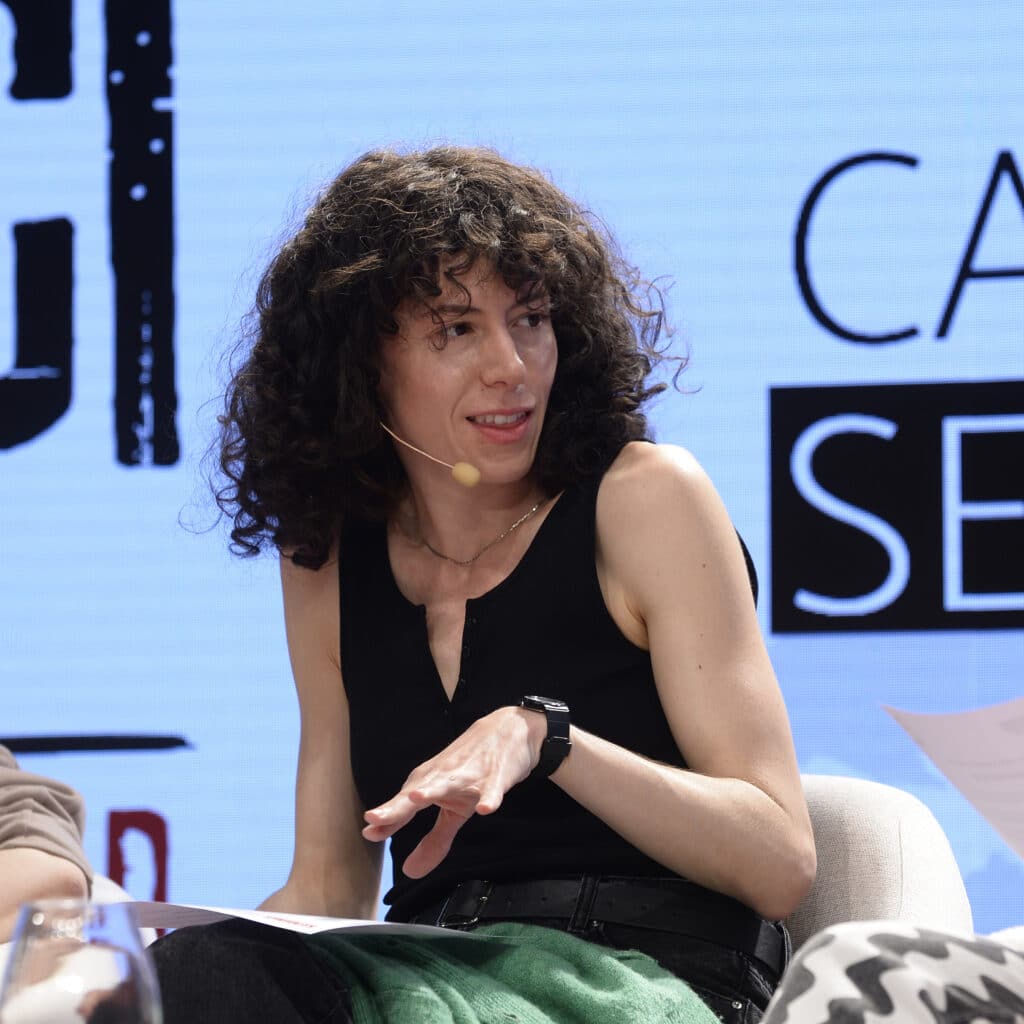
“Women in film criticism” was the central theme of the two working sessions of the Forum of Women Filmmakers, based on a previous report by Concha Gómez Maeso for the magazine Caimán Cuadernos de Cine on the role played by women in the world of criticism.
The sessions led to the drafting of a document of conclusions, which was made public on Sunday 23 October, at the end of the second day, at a round table discussion in the Miguel Delibes Hall, which the public could follow in person and also via Canal Seminci, on the festival’s website.
The conclusions of the forum
The participants in this forum were: Julia Yáñez, Andrea Morán, Elsa Tébar, Violeta Kavacsics, Andrea Bermejo, Elisa McCausland, Inma Merino, Pepa Blanes, Mireia Muñoz, Marta Armengou, Daniela Urzola, Paula Arantzazu Ruiz, Mariona Borrull, Júlia Gaitano, Julia Olmo, Nuria Vidal, Alicia Rambla and Raquel Loredo.
The director of the magazine Caimán Cuadernos de Cine, Jara Yáñez, was the first to take the floor: “We arrived with our tongues hanging out, with the feeling that we would have needed more time to debate so many issues and to have drawn up the conclusions in a more leisurely fashion, but even so we are very satisfied with the work we have done here”.
The conclusions were then read out, one by one, by the eight women who took part in the round table (the rest of the forum participants were seated in the front rows of the room).
CONCLUSIONS:
- Film criticism entails a positioning in the world; that is why we claim the feminist and trans-inclusive perspective as a tool inherent to the exercise of the profession.
- Within the framework of this feminist perspective, it is essential to generate intergenerational alliances and to create spaces for debate and encounters that are sustained over time.
- We consider it essential for film criticism to open up processes of genealogical research that allow us to see where women were and are, both in the industry and in the field of film criticism.
- We denounce the precariousness of a sector that is increasingly undermined in terms of salaries, staff and space in the media.
- Professionalisation must be the way to fight against precariousness, and for this reason it is necessary to strengthen the network of associations and, from these same associations, to implement codes of conduct and ethics in which equality is enshrined and which contemplate co-responsibility and care.
- We insist on the need for women to occupy more positions of responsibility and make decisions in order to reformulate the traditional and hierarchical structures in which work has been distributed and organised up to now.
- We propose that the new spaces and formats of film criticism that are emerging should also include a feminist and trans-inclusive perspective.
- These lines form part of an initial roadmap that we hope to continue working on in the future in future meetings, in which we can address complex issues that have been left a little unresolved, such as the shielding of independence, strategies for visibility, the creation of support networks and work with other professional spheres, or harassment in all its forms and channels.
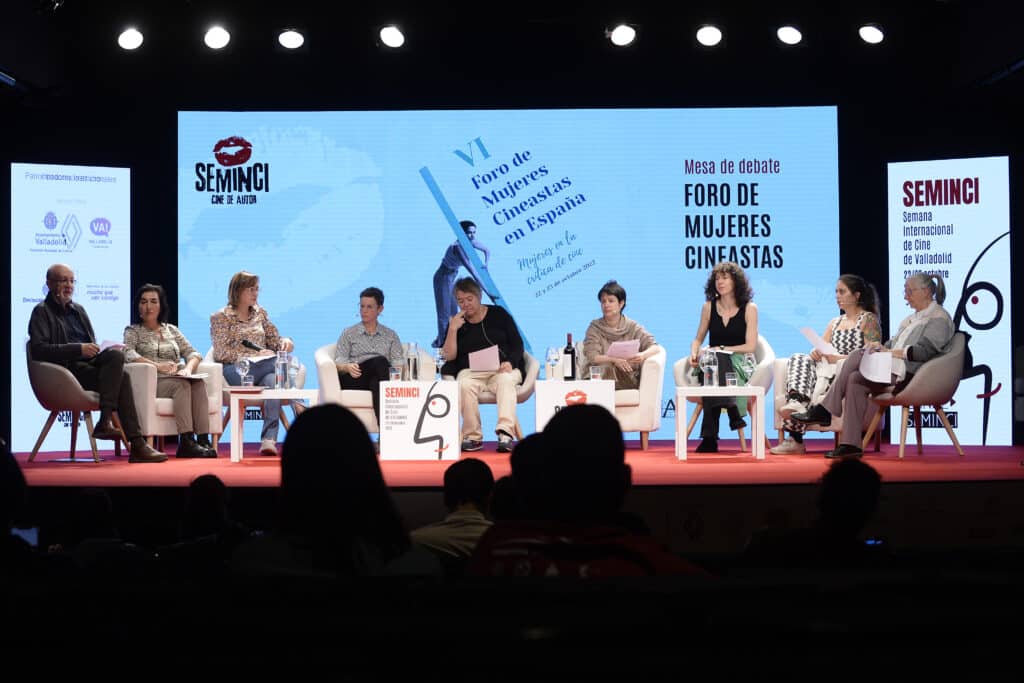
The previous report
Before reading the conclusions, Concha Gómez explained that, with the report she had written, which served as a starting point for the conference, “what I wanted to do first of all was to make a reference, albeit a very brief one, to the fact that women have always existed within film criticism and film journalism in our country”.
“In the 10s, 20s, even in the 30s [of the 20th century] there was a group of women, very varied and very diverse, who wrote in newspapers and specialised magazines about cinema, about their thoughts and reflections on the world of cinema, and also about film criticism. It is important that academia and research devote time and economic effort to vindicate the role of these pioneering women, because what we have tried to do here, one hundred years after they began to write, has been precisely to analyse the situation of film criticism”.
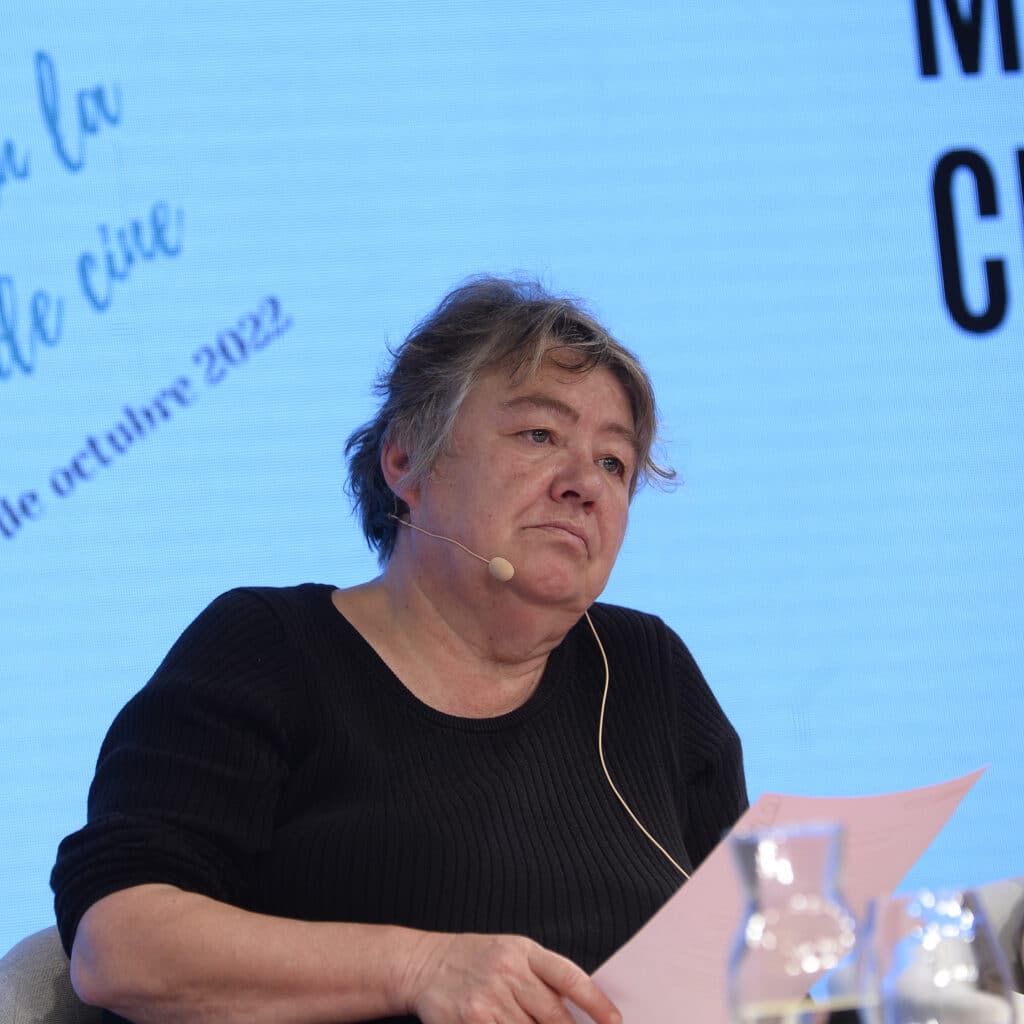
The first thing to be noted, according to Concha Gómez, is that “there is very little data on the women, men and non-binary people who today are involved in film criticism and journalism”. As she explained, “there are two associations that bring together critics, although their data is not broken down. These data show, for example, that in 2022, in the Catalan Association of Film Critics, which is one of the largest in this country, 72.19 percent are men and 27.8 percent are women, but the percentage of non-binary people is not broken down. The number of men who have joined the association has increased, but not the number of women. And this is repeated in the scarce data available on the sector”. In this sense, he called attention to the fact that “the first thing that needs to be done, in this sense, is research work to quantify the number of critics”.
The report has also sought to “highlight and, above all, bring to light the sector in which women film critics and journalists work; what their references have been, especially in the last decades of the 20th century, in order to make these women visible; how the sector has been regenerating and renewing itself in recent years and, of course, under what conditions they work, given that, as we will see, women work in an environment of great precariousness and lack of job stability”.
The report also analyses other issues, such as “work-life balance, maternity, recognition by male colleagues and the sector in general, and finally, whether film criticism makes sense today and what sense it makes, what is the project to be developed, with what means, in what forums, etc.”.
The debate, between illusion and hopelessness
In the debate that followed, between the women participating in the forum and the audience in the hall, it became clear that there is still much to be done. “One of the most positive things about the meeting was the realisation that behind a signature there is a face, and behind a face there is a person. We still have a lot to do and we have to keep doing it. We have laid the foundations to move forward with many things, let’s see if we are capable”, warned Nuria Vidal.
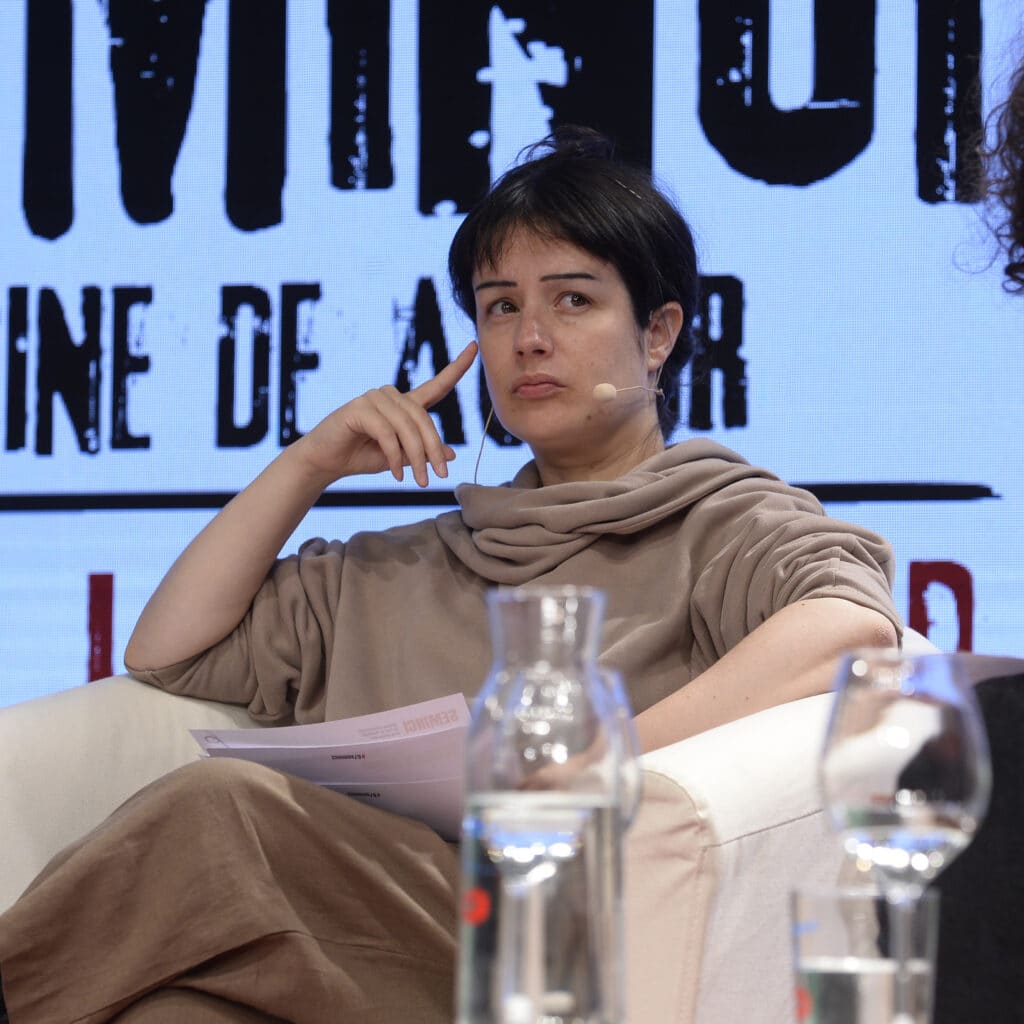
“The situation of precariousness does not only affect us, it is part of the precariousness of the labour market, the result of the capitalism in which we live. We need encouragement, because the outlook is so hopeless… In the traditional media, all working and economic conditions have been reduced and made precarious. The people who have been working on the internet are paid rates that are a thousand years old… and they have no hope of being paid more”, said Inma Merino.
“Another thing that has become clear to us is that, no matter how precarious things are, we are professionals. Even if we are paid little, our responsibility is to do a job well done and to try to project that there is a path to the future. No, there cannot be despair. There is another landscape, but we have a lot to say in that landscape. It’s not the same to post a twitter line as it is to write a review or an essay. We can’t lose sight of the fact that we are professionals, however precarious we may be”, insisted Vidal.
“It is also very important that there is a generational changeover. And the combination of traditional media with new technologies. We have to join forces, adapt, look for new areas to provide an outlet for this profession”, added another of the participants.
As to whether “male” critics have made progress when it comes to approaching film from a gender perspective, all agreed that, as Nuria Vidal summarised, “a less hegemonic way of thinking is permeating, another way of looking at the world, because there is not just one way of looking at it. We are beginning not to be weird. There are things that are no longer said, no longer written, there is no need to give lessons, it’s coming in. Feminist thought, without the need to raise our voices, is permeating society. Now of course, it is very slow… How many years has it been going on?
“Feminism is something universal and humanist, it’s not just for women. I’m fascinated by Godard, but there are elements of misogyny in his films, where women are between dolls and traitors at times, among other things. This doesn’t mean that it should be thrown away, but rather that it is good as a testimony of an era, and to rethink it”, exemplified Merino.
“We have to try to consolidate a minimum network of debate, of discussion, even if you don’t agree. Creating these spaces is one of the priority tasks. If we find support in festivals, or in the administration, great. But if not, let’s invent them. We can hold meetings similar to this one, online, the net can be an accessible space for debate. There are things that have been left out, but we can take advantage of the new technologies, and continue debating”, insists Vidal.
The vindication of criticism as a space for creation, and even as a space of freedom for analysis and reflection, was the closing theme of the debate. This was underlined by another of the participants: “What we see is that the space dedicated to culture is increasingly reduced in the media, and that of cinema even more so. Culture needs space and time, but also a critical eye, in order to value it”.
The critic Carlos F. Heredero, who acted as moderator, closed the debate by recalling, for his part, another of the definitions of “criticism”, which he understands as “the exercise of reason in the face of the principle of authority”. “We exercise this criticism from a feminist and liberating perspective,” concluded Heredero.
The Women Filmmakers’ Forums
The Women Filmmakers Forums were born in 2017, as a joint proposal of the Seminci and the magazine Caimán Cuadernos de Cine, with the aim of analysing the female presence in the Spanish audiovisual industry. In them, the debate offers a general diagnosis of the situation of professional women in the world of film linked to different fields such as directing, with the presence of established and new directors; film and television production, or the role of women in film teaching, in all educational fields. Each year, the working sessions conclude with a document of conclusions and measures in favour of advancing towards parity.
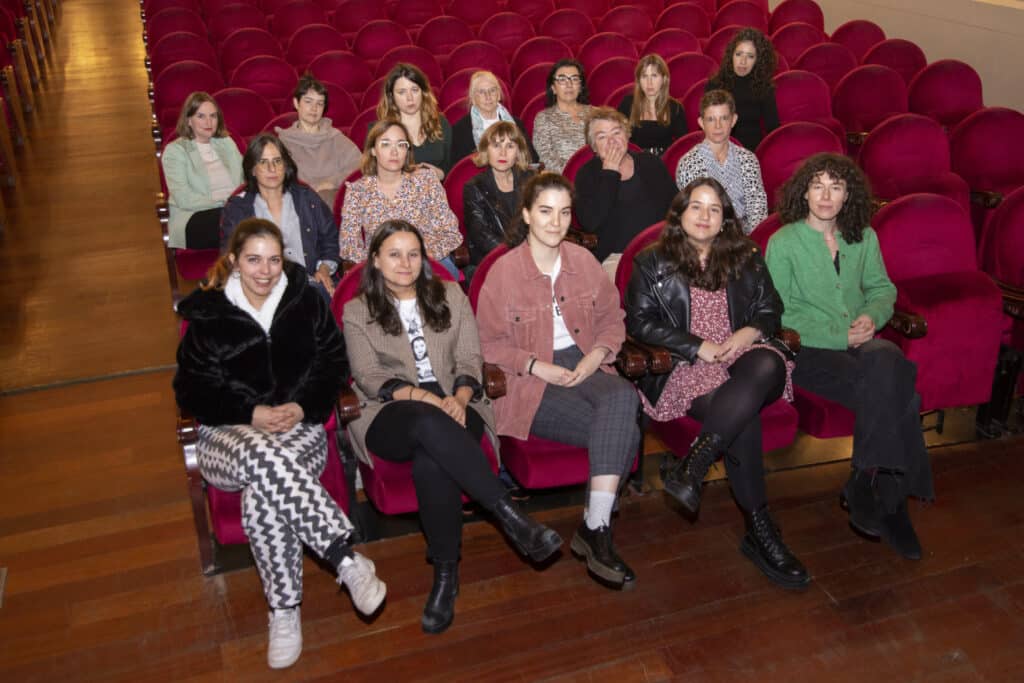



























![Logo Foro Cultural de Austria Madrid[1]](https://www.seminci.com/wp-content/uploads/2024/09/Logo-Foro-Cultural-de-Austria-Madrid1-300x76.jpg)








